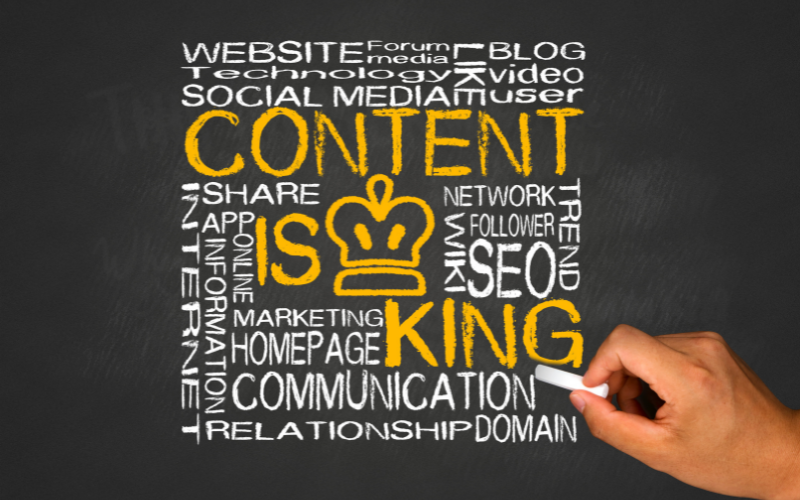Remember those in-your-face banner ads that you probably suffered ages ago? The ones that demanded your attention even though you had zero interest in the product? Those days are long gone, thanks to the increasingly buyer-centered world of marketing surfaced. Welcome to the world of content marketing. But wait, what is content marketing exactly? Intriguing, isn’t it? In this article, we’ll dive deep to demystify the ins and outs of content marketing.
“Content marketing is all about the customer. It’s about how to deliver insightful information in the most engaging way possible, creating a mutual relationship of trust between a brand and its audience.”
Table of Contents
Content Marketing Defined
Content marketing is a strategic approach centered around creating and distributing valuable, relevant, and consistent content to attract and retain a clearly-defined audience — ultimately driving profitable customer action.
Examples of Content Marketing
To savour the richness of content marketing, we need to understand what it looks like. Here are some examples:
- Bite-sized, relatable social media posts
- Engaging, informative blog articles
- Instructional “How-To” videos
- Interactive quizzes
- Knowledge-rich webinars
- eBooks or white papers filled with insights
Instead of the old-school method of bombarding a general audience with product pitches, content marketing delivers information that enriches the audience’s knowledge or skills, making them more informed buyers.
Content Marketing Defined: The Why Factor
But why is content marketing so instrumental in the digital age? Let’s delve into some driving forces behind content marketing’s ubiquity:
Cultivates Trust and Loyalty
“Trust is the most robust bond between a brand and its consumers.”
Publishing high-quality, useful content shows your audience that you’re an expert in your field. Plus, by offering this information freely, you cultivate a sense of trust, making customers more likely to choose your business when they’re ready to purchase.
Boosts SEO Efforts
Who doesn’t want to be on the good side of search engines? Quality content is a feast for search engines, making your website more visible and accessible for potential customers.

Contributes to Conversions
Insightful content drives your audience to take action, whether it’s subscribing to a newsletter or making a purchase. You’re basically guiding them along the buyer’s journey with your content.
How to Create a Winning Content Strategy
Creating irresistible content is no walk in the park. It requires strategic planning, time, and effort. Here’s how you can develop an effective content strategy:
- Define Your Goals: What do you want to achieve with your content marketing efforts? More traffic, leads, or brand awareness? Your goals will shape your strategy.
- Understand Your Audience: Identify your target audience. Understand their likes, dislikes, and pain points.
- Produce Quality Content: The quality of your content will make or break your content marketing efforts. Ensure your content is accurate, insightful, and engaging.
- Plan Content Distribution: Distribute your content on the platforms where your audience is most active.
- Evaluate Success Metrics: Keep track of metrics like traffic, clicks, and conversions to understand what’s working and what isn’t.

Conclusion
In the information age, content marketing is no longer a “nice to have” – it’s a necessity. By providing your audience with valuable, relevant information, you’re sowing seeds of trust that will flourish into business growth and customer loyalty. Are you ready to kickstart your content marketing journey?
“Valuable content is a journey, not a destination. Keep exploring, creating, and making your audience fall in love with your story.”
Content Marketing Defined: Questions and Answers
Q1: What is content marketing, and how does it differ from traditional advertising?
A1: Content marketing is a strategic approach to marketing that involves creating, distributing, and promoting valuable and informative content to engage and retain a specific target audience. Unlike traditional advertising, content marketing doesn’t focus on direct promotion; instead, it provides useful content to build trust and credibility with the audience.
Q2: How has content marketing evolved over time?
A2: Content marketing has a rich history dating back to the 18th century when Benjamin Franklin published “Poor Richard’s Almanack.” In the digital age, it has evolved to leverage the internet’s global reach and precise audience targeting, making it a crucial part of modern marketing.
Q3: What are the core concepts of content marketing, and why are they essential?
A3: Core concepts include an audience-centric approach, the understanding of target audiences, and the development of buyer personas. These concepts are essential because they help tailor content to resonate deeply with specific audience segments, increasing its effectiveness.
Q4: Can you explain the four pillars of content marketing?
A4: The four pillars of content marketing include strategy and planning, creation and production, distribution and promotion, and measurement and analysis. These pillars guide the content marketing process from setting objectives and content creation to ensuring its effectiveness through analytics.
Q5: How can content marketing benefit businesses in practice?
A5: Content marketing can benefit businesses by building brand awareness, generating leads, nurturing customer relationships, establishing authority, and ultimately driving conversions. It’s a holistic strategy that can impact all aspects of the customer journey.
Q6: What are some of the challenges and pitfalls of content marketing?
A6: Challenges include content overload, keeping up with algorithm changes, balancing quality and quantity, and targeting the right audience. These challenges underscore the need for a well-planned and well-executed content marketing strategy.
Q7: What are some emerging trends in content marketing?
A7: Emerging trends include the use of AI and automation, interactive content, user-generated content, and a focus on sustainability and ethical marketing practices.
Q8: Can you share some success stories of content marketing in action?
A8: Red Bull’s Stratos Jump, HubSpot’s inbound marketing, and GoPro’s user-generated content are examples of successful content marketing campaigns. Each case demonstrates the power of storytelling and engagement in different contexts.
Q9: How can small businesses, e-commerce, and B2B enterprises leverage content marketing?
A9: Small businesses can focus on niche audiences, while e-commerce can benefit from compelling product descriptions and reviews. B2B enterprises can build trust through case studies and whitepapers.
Q10: What are the legal aspects of content marketing that businesses should be aware of?
A10: Businesses should be mindful of copyright and plagiarism issues in their content, and they must also respect data privacy and GDPR compliance when handling customer data.
Q11: Can you provide an overview of a content marketing campaign’s key stages?
A11: A content marketing campaign typically involves initial planning, content creation, distribution and promotion, and measurement and optimization to ensure its success.
Q12: In conclusion, what is the essence of content marketing, and why is it so powerful?
A12: Content marketing is a dynamic strategy that harnesses the power of storytelling to build lasting connections with the audience, forge relationships, and drive success in the digital age. Its ever-evolving nature makes it a powerful tool for businesses in the modern world.




